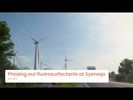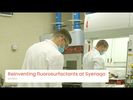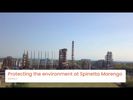Leveraging innovation to develop sustainable solutions
As a company of explorers and innovators, we use science not only to help us identify new opportunities and breakthroughs, but also to reinvent solutions for legacy methods that can be improved.
The development of our non-fluorosurfactant technologies is an example of this innovation at work. These technologies use a new polymerization process that does not require the use of fluorosurfactant process aids from the PFAS family of compounds.
Innovating with Non-Fluorosurfactant technologies
At Syensqo, we are proud to produce a vast majority of our fluoropolymers – materials that are essential for electric vehicle batteries, hybrid engines, hydrogen applications, renewable energy installations, semiconductor manufacturing, medical devices, and more – without the use of fluorosurfactants.
Guided by our sustainability roadmap, we quadrupled our investment in R&I since 2019 to invent a new polymerization process using our non-fluorosurfactant technologies.
Our ambition
Syensqo’s goal is to phase out the use of fluorosurfactants globally. Our success in developing non-fluorosurfactant technologies in the U.S. at our West Deptford, New Jersey facility was a major step in this journey, and we are now working towards the objective of manufacturing nearly 100% of our fluoropolymers without the use of fluorosurfactants in Spinetta Marengo, Italy by 2026.
Quick facts on Syensqo and PFAS
- Syensqo has never manufactured or sold PFOA or PFNA.
- Syensqo never used PFOS or manufactured firefighting foams—a key source of certain PFAS in the environment.
- Syensqo voluntarily phased out use of PFOA and PFNA in the U.S. in 2003 and 2010, respectively, and phased out use of PFOA globally in 2013.
- Today in Spinetta Marengo, we only manufacture limited quantities of a next generation fluorosurfactant (C6O4) while we transition to the new non-fluorosurfactant technology.
- In addition, for our manufacturing in Spinetta Marengo, Syensqo applies state-of-the-art technologies that eliminate nearly 100% of fluorosurfactant emissions.
Our products
Our breakthrough polymerization process using Non-Fluorosurfactant (NFS) technology enabled the development of a first portfolio of Tecnoflon® peroxide curable fluoroelastomers (FKM) in 2022 and in 2025, a market-first non-fluorosurfactant Tecnoflon® perfluoroelastomer (FFKM) as well as Aquivion® N+ NFS, a next-generation fluoro-ionomer designed for clean energy and electrochemical applications.
These advancements set a new industry standard for high-performance materials, supporting the transition to Non- Fluorosurfactant solutions across critical industries in response to the industries’ evolving needs for performance and greater sustainability.
Frequently Asked Questions
PFAS includes a very large spectrum of substances, with very diverse properties. Syensqo has been innovating to find alternatives for the PFAS substances that may trigger concern, which is why our focus has been on phasing out the use of fluorosurfactants.
Fluoropolymers are materials that are essential for electric vehicle batteries, hybrid engines, hydrogen applications, renewable energy installations, semiconductor manufacturing, medical devices, and more. They are chemically inert, meaning they are non-toxic, not bioavailable, non-water soluble, and non-mobile.
Fluorosurfactants are small, non-polymeric molecules used in the manufacturing of some fluoropolymers. In our Spinetta Marengo site, we use limited quantities of C6O4, a next generation fluorosurfactant, which unlike other fluorosurfactants, is not bioaccumulative.
Syensqo already produces a vast majority of our fluoropolymers – materials that are essential for electric vehicle batteries, hybrid engines, hydrogen applications, renewable energy installations, semiconductor manufacturing, medical devices, and more – without the use of fluorosurfactants.
Today, we use limited quantities of a next generation fluorosurfactant – C6O4 – which is not bioaccumulative – as a processing aid in the development of certain fluoropolymers at our Spinetta Marengo production facility. C6O4 is registered in accordance with REACH (the European Union's regulation for the Registration, Evaluation, Authorization and Restriction of Chemicals), and has been approved by the EFSA (European Food Safety Authority). In this facility, we apply state-of-the-art techniques that eliminate nearly 100% of fluorosurfactant emissions, while we work to transition this facility toward non-fluorosurfactant technologies by 2026.
We have five fluoropolymer production sites, four of which do not use fluorosurfactants:
- Orange (TX, USA)
- Changshu (China)
- Tavaux (France)
- West Deptford (USA) – Phased out the use of fluorosurfactants in 2021 with our launch of new non-fluorosurfactant technologies.
Today, we use fluorosurfactants only in our Spinetta Marengo facility. In this facility, we apply state-of-the-art techniques that eliminate nearly 100% of fluorosurfactant emissions, while we work to transition this facility toward non-fluorosurfactant technologies by 2026.
In Spinetta Marengo, we apply state-of-the-art technologies that eliminate nearly 100% of fluorosurfactant emissions from the facility, and have invested more than EUR 60 million in new advanced water treatment technologies (reverse osmosis and activated carbon) to eliminate fluorosurfactant emissions.
The Spinetta facility complies with all the environmental permits granted by the competent authorities and is one of the most monitored sites in Europe, with hundreds of analyses done by the authorities per year.
Syensqo closely monitors the health of its workers through regular testing (over 800 people since 2004). We have carried out more than 7,700 blood tests over the past 20 years. All results have been shared transparently and consistently with employees, with unions and health authorities. The occupational medicine department also consistently carries out annual and detailed health checks for each employee. These assessments did not report any clinico-toxicologic effects towards the health of our employees working in contact with fluorosurfactants.
No. We have successfully developed non-fluorosurfactant technologies at our West Deptford, New Jersey facility and announced the launch in May 2021. This represents a major step towards Syensqo’s goal of phasing out the use of fluorosurfactants globally.
In June 2023, the Company (at that time still Solvay) reached an agreement with the New Jersey Department of Environmental Protection (NJDEP) regarding PFAS related claims in New Jersey. The agreement resolved NJDEP’s litigation against the Company without admission of liability. It represented a constructive and timely path toward remediating PFAS in the environment, while allowing the Company to recover costs from other sources of PFAS, as the settlement explicitly recognized that the Company has the right to seek compensation from such other contaminators. The settlement included commitments to complete remediation activities that the Company began voluntarily, upon learning of detections of PFAS in the area, in 2013, including testing water and soil near the West Deptford site, and the Company has agreed to establish a remedial funding source in the amount of $214 million to fund those activities.
Additional information on the status of Syensqo’s litigation can be found in our latest annual report under “Risk management”.
The Syensqo site in Tavaux does not use or produce fluorosurfactants. At Tavaux, Syensqo manufactures Polyvinylidene Fluoride (PVDF), a fluoropolymer used in the production of new generations of lithium-ion batteries for hybrid and electric vehicles by leading battery manufacturers worldwide. The portfolio includes binders and separator coatings for Li-ion cells that are safe and stable electrochemically and thermally, with high energy density and a long lifespan.













